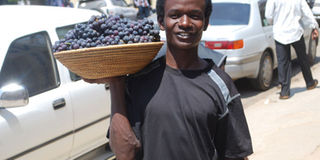Grapes business flourishes in Mbarara

Augustus Muhereza, a grapes vendor in Mbarara. The fruits are on high demand in the town. PHOTO BY COLLEB MUGUME
Vending grapes is now a common business on the streets and in the markets of Mbarara Town. This can attributed to the presence of several farmers in the district who supply the fruits.
Stanislus Kamanyiro, who is involved in grape growing, shared the idea with many people in other western districts like Bushenyi, Rukungiri, Kabale and Kisoro. Some of these continued to establish plantation of grapes, which are supplied to the local markets.
Like other businesses, there are several people along the chain; first, the farmers, then the middlemen who buy from farmers and the vendors, who buy from the middlemen.
Business
The vendors sell a cluster between Shs 1,000 and Shs2,000 depending on how big it is. Nicholas Musinguzi, a vendor, says, “Business is good, I get the fruit at about 9am in the morning and sometimes I go home at 1pm when I have sold all in my basket.”
Some of the vendors are engaged by middlemen to sell the grapes and earn a commission on the sales.
“When I am given fruits worth Shs50,000 and I make Shs60,000, the Shs10,000 is mine and I also get paid another Shs 10,000 as commission,” Musinguzi explains.
Vincent Tukwasibwe, a trader, buys 80 kilogrammes at Shs5,000 each. These are divided into clusters of different sizes, which are sold at Shs1,000 or Shs2,000. From this, he gets about Shs 500,000.
The traders buy the grapes from different farmers. The prominent suppliers in Mbarara District are Stanislus Kamanyiro, from Nyakairu Sub county, and Moses Bashaija and Robert Mpuku, both from Rwampara Sub county.
The business is good except that at times the stock gets damaged during transportation and it sometimes stays overnight, which leads to losses. According to Kamanyiro, a kilogramme contains between six to eight clusters depending on the fruit size.
Blossoms
“The fruit size depends on the weather, which affects the production because when it is dry, the fruits are small and when it is raining, the fruits get thick. The care a farmer gives the vines also determines fruit size,” he says.
Given that the farmers leave it to nature to take care of the vines, production is not maximised. The fruits are affected by fungal diseases like black rot and mildew, which can prevented by spraying. And vermin like birds including chickens and bees eat the fruit leading to poor production.
The fruit has no definite season of harvest since it blossoms after pruning. The farmer therefore has liberty to control production by not pruning.
Boost
Farmers grow various types like Pinot Noir, which are purple with seeds, and Chardonnay, the green and seedless ones. Pinot Noir is the commonest type on the market in Mbarara.
When the season is good, production is about 3.5 tonnes per acre. Although there is no definite exporting company, Kamanyiro, who is in the process of building a factory ,hopes that when the factory become operational, there will be sorting and packaging of fruit, juice making, wine making, seed production and the residue to get mentholated spirit and manure.
Although the factory may take the vendors out of business, it will be a good market for the farmers, who will be sure of a market to sell their produce. It may also boost the growing practice in the country.




